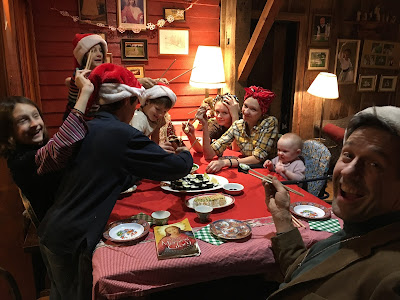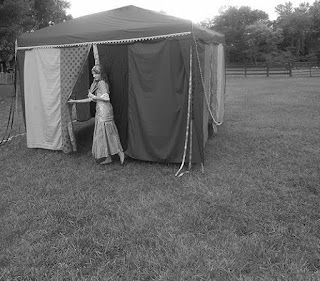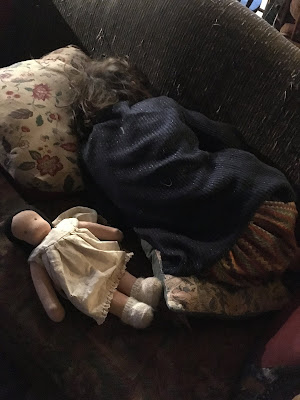My Family, the Church: a Big, Rowdy Family
Originally published in the Spring 1993 edition of Caelum et Terra magazine.
Author's note: this in some ways is probably the most popular article I've ever written. I have certainly had people refer to it and request it over the years. The problem has been that it was written in the pre-internet days when I was working on an Apple Macintosh, and the electronic copy is on a tiny plastic disk deep in my long-term storage. I've finally been moved to type it out at last, since an old friend sent me her print copy. It makes an author feel old to realize that nearly 27 years have passed since the fervent and passionate college graduate wrote these words while immersed in the world of late 90s Catholicism in New York City. Yet it's also cathartic to recognize that, by the grace of God, I believe in what I wrote just as firmly. By the grace of God! Blessed Christmas 2020 to you all.
In the days when everyone complains of conformity and the squelching of individualism (the chronic American complain) and the epic search for One's Own Self, I find myself, fresh out in the world, in quest of a group of people with whom I can identify.
It is, in large part, an unconscious search. I grew up in a family of ten children, and I have to admit that I don't feel like myself unless I am speaking from the midst of a crowd. I long to start my sentences with that precious word, "We..."
Others have rebelled against their families and broken out into freedom. I have rebelled against my freedom and desire closure: the intermingling of one uncomfortable life with another, those constant jostles and elbows and crampings into small corners that assures you that you are affecting and being affected by others. Some might feel claustrophobic in a van with ten screaming kids: I feel at home. I am probably the only commuter who feels a stab of nostalgia while riding the crowded subways of New York City.
Identity, I feel, is not so much who you are as who you're with. Even the word "Christian" conveys the sense of "one of Christ's." Catholics, I have been told, are the ones with the most understanding of the word "we." Of course, the speaker added, one couldn't really see that in American Catholicism: apparently we are too influenced by Protestant individualism.
This longing for community is essential if you're facing an impossible task, such as living a highly moral life in today's "death culture." When I was a teenager, I aspired to such a task. Whenever I thought, "The whole world is against me," I felt almost suicidal. But give me even the minority of one other person who shared the same ideals, and the phrase, "The whole world is against us" suddenly had the thrill of romance, the stirring of a call to martyrdom.
I can't tell you how much the Holy Father's call to youth meant to me when I was a teenager. He really seemed to think we could do something. He always spoke to the collective: "the Youth of the World." In a world of specialization, I suspect we were craving the inattention of the collective.
Now, don't get me wrong. I have never desired to be one of a regiment of identical soldiers, or a statistic, or a Benetton model. When I picture group, I visualize family. I don't know of any family, save a family of identical twins, that is wholly homogenous. I find when you mix a bunch of people, quite often you end up with diversity, as people begin to define themselves in relationship to one another.
And the thing I love about the Catholic Church is its incredible diversity. Despite the amazingly vast output of Catholic schools, grown-up Catholics manage never to look like the rows of little uniformed tykes they were in grade school. In fact, the deeper you get involved with Catholics (and with Christians in general), the less likely you are to find two who think alike. I'll give you another example from my college career.
Attending the Franciscan University of Steubenville, an orthodox Catholic school that likes to call itself a "family" university, was an experience of the vast Catholic menagerie of spiritualities that the Church, like a ringmistress, valiantly strives to herd together under one tent. At Steubenville, there were kids from the charismatic prayer groups and kids from the "liberal" youth groups and kids from the staid traditional Catholic homes. There were wonderfully passionate kids who swore they'd never go anywhere but the blessed University of Steubenville, and kids of other passions whose parents didn't dare send them anywhere else by Steubenville. There were ex-drug addicts and recovering alcholics and folks recovering from all sorts of psychological ills. There were white-bread kids and small-town kids, the progeny of middle-class nobodies and big-name somebodies.
As can be imagined, each type had its version of What Was Wrong with the school. There were intellectuals who were appalled at the "unacademic" atmoshpere and big-city kids who moaned that there was nothing to do but study. There were wild-fire charismatics who grumbled at the stodginess of the administration and traditionalists who lamented the untamed Spirit of Vatican II which had demonically possessed the faculty. There were converts from Bible schools amazed at the lack of curfews and remnants from hedonism who wailed at the strictness of the visiting hours.
It was a worldwide mix. There were students from the Midwest and from Japan and from Canada and from the Carribean. There were twelve tiny black nuns from Nigeria. There was a whole contingent of Latino Catholics who clapped noisily at their Spanish Masses and seemed to want to dedicate everything to "La Virgen Maria." There were those in the pursuit of the religious life and those obviously in search of a spouse. There were fraternity brothers drinking beer and academics sipping wine and ascetics drinking water all atop the same hill, almost from the same cafeteria glasses.
And of course, there were the disputes. There were liberals accusing conservatives of being ultra-conservatives and conservatives accusing the liberals of heresy. There were heartfelt pleas for more peace and tranquility side by side with crowing denunciations of apathy and sloth. There was a small segment who claimed to ignore everybody because they just wanted to be "detached." There were factions and societies and splits and splinterings, gossip and hearsay and misinformation and partial slander and outright lies--enough tempests to rock the teapot of the campus and keep the campus ministers on their knees praying for strength.
People used to bewail the fact that so many people who all believed the same doctrines could fight so much. I, however, was in a constant state of shock at the fact that they got along as well as they did.
My mother, in raising her ten children, always used to say she was housing a flock of chiefs with no Indians, and since childhood I've been surrounded with the voices of controversy. I always took it as a given that wherever there are people, there are disagreements. And the Church, if it has anything, has lots of people.
It was very seldom that my family agreed en masse about anything, except maybe eating. Whenever we did agree, it was an almost terrifying consensus. I tend to be afraid of too much sameness, of too much agreement without checks and balances. Because none of us is omniscient, if no one has reservations about a course of action, I think it is more likely that the group is missing everything rather than missing nothing. If we are all facing the same direction, no one will notice the enemy sneaking up behind. I know many times a plan or a group has been saved by the one person who thought to look the other way and noticed Immient Disaster approaching. So, in a paradoxical way, I tend to hear the voices of disagreement as a sign of harmony. However, in our fallen world, paradox is a creature friendly with the divine.
And at Steubenville, it was a comfortable disagreement. We might have torn out each other's throats on the question of standing or kneeling during the "Great Amen," but none of us doubted the Real Presence. We might shout oceans of rhetoric over the validity of Operation Rescue, but we all agreed abortion was wrong. The campus was a gem of orthodoxy in a sea of unbelief, and, by outside standards, fanatically close-minded and unified. We on the inside knew better. There was no typical Steubenvillite. If you are a Catholic, try and define a typical Catholic and you'll see what I mean. Just as a stained-glass window seen from the outside seems to be a panel of murky darkness, so Christians (and Catholics) appear to be a homogenous mass of humanity as seen by the unbeliever. It's only from the inside of the Church that you can best see the startling contrasts, the sharp delineations, the harmony, and fleetingly, the beauty.
You notice that the only people who are good at satirizing Catholicism are those who are Catholic. It's only the veteran of a Catholic school who can make us howl with laughter over an insightful bite on how all nuns did such and such. Put the same irreverent banter about nuns and popes in the lips of a scornful atheist or a hardened fundamentalist (or an Irish rock singer) and watch how the images flatten into stereotypes that no one can believe or enjoy. From the inside, you can understand the oddness while respecting the reality. From the outside, Catholicism is as humorous as a surrealistic play, too strange to be funny.
In order for two people to have a really good fighting argument, they should at least agree on a few principles. There must be at least one common factor: at least a common language, if they are ever going to get around to slinging mud at each other and making noise. In fact, the more that they have in common, the more violently they will disagree. That principle can be seen at work in Catholicism among those who are supposed to be allies. Among those who believe in black and white, there are few grays.
The more Catholics I meet, the more I'm amazed that Christ is able to shelter us all. The more members I meet, the more I begin to see that the gift of unity is truly a gift, and that the Church is no minor miracle for remaining "one body" for 2000 years. My dad always said the biggest case against the Protestants is not that they are less doctrinally exact or less morally holy than Catholics, but the fact that they can't stick together. As if they are victims of a hereditary disease, the bodies of Christians outside of the Church keep diving and diving, always losing that craved "unity which has the Spirit as its origin and peace as its binding force." (Ephesians 4:2) Some of them have come to the conclusion that Christ never meant for Christians to be together in one Church, accepting separatism as the law of the Spirit.
Which is a pity, because right across the street from the Baptist church is a Church whose members quarrel violently among themselves but all take communion at the same table. Catholics all recite the same Creed, but on just about everything else that they are allowed to disagree on, they voice their opinions loudly and adamantly. The spats over the validity of this or that Marian apparition are just one example. Another is the gamnut of religious orders: militaristic Jesuits, intellectual Augustinians, teaching and preaching Dominicans, contemplative Carmelites, orders ministerial, spiritual, social, eremetical, and questionable. Even the typical Franciscan is enigmatically difficult to classify: is he or she of the First, Second, or Third order? Reformed, Cappuchin, or Reformed Cappuchin? Conventual, cloistered, itinerant? "Traditional," "liberal," "moderate," or "charismatic?" And yet all of them answer to the name Catholic.
Looking at the history of the Catholic Church closely, one can see that the tensions among Christian brethren are far from recent developments. In this discussion, I'm overlooking the heresies, the schisms, and the most obvious instances of discord. There were fistfights at the Council of Nicea among hot-blooded bishops and followers determined to hammer out the doctrine of the Trinity. Peter and Paul disagreed on the manner of initiating Gentile converts. And disagreements weren't always over rights and wrongs in doctrines and practice: among the rank-and-file early believers, there were some who honestly preferred Apollos' teaching style to Paul's. The important thing, as Paul pointed out, is that we are all Christ's.
The Church, like the human race, has always been characterized by diversity of the lion-and-tiger type that seems to do nothing but cause trouble. Why didn't God just create "cats," large and small, and save biologists the trouble of trying to divide and classify? Why not have a Church as the simple evangelical groups visualize it: pristine, holy, all believers in matching white robes, all Greek intellectualism, Jewish culturalism, Gentile worldliness, manly agressiveness, and womanly complexities washed away in Christ?
Why is it that the human Christian tends to retain all his lumps and knobs, provincialism and opinions, preferences and ingrained loyalties that will send him crashing inevitably into his equally well-meaning and idiosyncratic neighbor? It can't be merely human sinfulness, for St. Thomas Aquinas argues, logically, that even the most holy people will often differ in their approaches to solving the same problem. None of the children my mother bore are twins. No two European countries are alike, and no two African republics. There seems to be a stubborn and virile non-conformity among Catholics that now homilist or liturgist can subdue, save Christ.
That's the way it's always been, starting with the first collection of twelve mismatched apostles, and I can't believe that it will ever cease to be. In Heaven, all Christian divisions will, thank God, come to an end, but Christian diversity? The name "Catholic" means "universal" and if anyone is shocked at the wide variety of folks in the Church, he or she should remember that it's possible to find just about anything in the universe. The Lord God made them all. And blessed be His name.



Comments